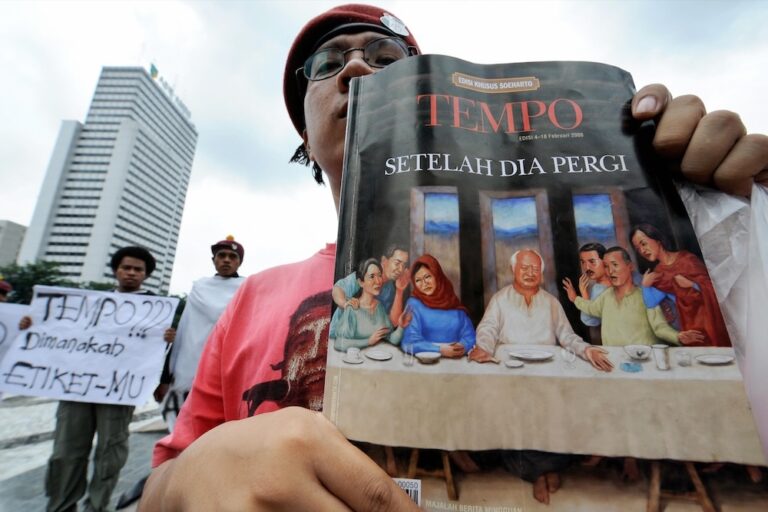(SEAPA/IFEX) – The Indonesian courts have sentenced “Tempo” editor Bambang Harymurti to one year in prison over charges of criminal defamation in a decision that quickly drew condemnation from journalists and free-press advocates worldwide. SEAPA called the verdict “sad and unfortunate” and “a blow to the credibility of Indonesia as a democratic nation.” Harymurti and […]
(SEAPA/IFEX) – The Indonesian courts have sentenced “Tempo” editor Bambang Harymurti to one year in prison over charges of criminal defamation in a decision that quickly drew condemnation from journalists and free-press advocates worldwide.
SEAPA called the verdict “sad and unfortunate” and “a blow to the credibility of Indonesia as a democratic nation.”
Harymurti and two of his reporters, T. Iskandar Ali and Ahmad Taufik, were sued by businessman Tomy Winata for suggesting in a published article that Winata stood to gain from a fire that razed a marketplace in Jakarta last year. It was the ninth time Winata had filed a case against “Tempo” in two years, raising charges from Indonesian journalists that his “financial and legal harassment” of Jakarta’s journalists was becoming “habitual”.
In the run-up to the release of their ruling on 16 September 2004, Indonesian judges sent mixed signals on the court’s respect for press freedom. On 14 September, they upheld “Tempo”‘s appeal in two other libel suits filed by Winata, dismissing the cases as improper. Winata should have resorted to the existing Press Law, not the Criminal Code, the judges said, echoing the position of Indonesian journalists and international free-press advocates.
Then, just prior to convicting Harymurti, the courts acquitted Ali and Taufik. Their rationale for the acquittal, however, merely asserted that the editor, rather than the reporters, was ultimately responsible for the story. Two hours after releasing Ali and Taufik, therefore, the judges convicted Harymurti.
The “Tempo” editor stated his intention to appeal. He will remain free until that appeal is resolved.
While sympathisers welcomed the release of Taufik and Ali, SEAPA stressed that “in the end, the Indonesian courts have still cast a dark, heavy cloud over the Indonesian press.” The organisation said Harymurti’s conviction will inevitably have a chilling effect on the Indonesian media.
Speaking to journalists, Harymurti had expressed hope that an acquittal on the charges against him “would do for Indonesia what ‘New York Times’ v. Sullivan did for free expression in the United States.” SEAPA Executive Director Roby Alampay said, however, that instead of raising the bar on libel, the Indonesian courts made their country’s press all the more vulnerable to harassment. “Journalists in this supposedly democratic nation will think twice before saying anything, before even asking questions, even on matters of clear public interest,” Alampay said.
SEAPA joined the Committee to Protect Journalists (CPJ), the International Federation of Journalists (IFJ) and other free-press advocates from around the world in condemning the verdict and in expressing solidarity with the beleaguered Indonesian press.
CPJ and SEAPA jointly sent a delegation of journalists from across Southeast Asia to monitor the conduct of the “Tempo” case. Joining CPJ and SEAPA in the delegation were: Teodoro Locsin Jr., member of the Philippine House of representatives and publisher of the Manila daily “Today”; Inday Varona, chairman of the National Union of Journalists of the Philippines; Steven Gan, editor of Kuala Lumpur’s leading alternative news outlet, Malaysiakini.com; Boonrat Apichattrisorn, vice chairman of the Thailand Journalists Association and foreign news editor of the Bangkok daily “Kom Chat Luek”; and Professor Ubonrat of Chulalongkorn University and the Center for Popular Media Reform.


